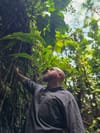Is Ayahuasca for Everyone?
Not every Ayahuasca journey leads to healing. Learn who may benefit, what the risks are, and how therapy can support conscious, grounded decisions.
What to know before drinking Ayahuasca
Ayahuasca has gained visibility among those seeking healing, self-awareness, and spiritual experiences. But is it really for everyone? The answer is no — and that’s exactly why psychological and emotional preparation matters so much.
When Ayahuasca can be beneficial
A genuine desire for inner work
Those who seek to connect with themselves, revisit their life story, and expand their consciousness often benefit the most — especially when supported by therapy.
Basic emotional stability
You don’t have to be fully “resolved,” but it’s important to have some emotional grounding. That includes the ability to face discomfort and remain open to self-inquiry.
Therapeutic support
Having a psychologist before and after the experience helps give meaning to what arises — visions, emotions, memories — and prevents misinterpretation or spiritual bypassing.
When Ayahuasca may be risky
Psychiatric conditions
People with a history of schizophrenia, bipolar disorder, or psychotic episodes should avoid Ayahuasca unless under medical supervision within a clinical or research setting.
Escapism or avoidance
When people turn to Ayahuasca to flee from emotional pain — rather than face it — the experience may reinforce confusion, disconnection, or dependence on mystical highs.
Social pressure or trend-chasing
Participating in a ceremony just because “everyone else is doing it” or for the novelty of it can be harmful. This is not a trend — it’s a serious, sacred process.
Alternatives if you’re not ready (yet)
If you’re curious about Ayahuasca but sense the timing isn’t right, that’s okay. Integrative therapy can help you prepare emotionally and spiritually. Other gentle paths — like breathwork, conscious movement, or art-based therapy — can open safe, meaningful inner journeys.
The psychologist’s role in this journey
A psychologist familiar with ancestral medicines can support you in evaluating whether this experience aligns with your current state. More than that, they offer an essential bridge between mystical insights and personal growth.
Conclusion
Ayahuasca is not a shortcut — and it’s not for everyone. It’s a tool of transformation, and like any tool, it requires discernment, support, and responsibility. If you’re unsure, your first step might be talking to someone who understands both the medicine and the mind.

